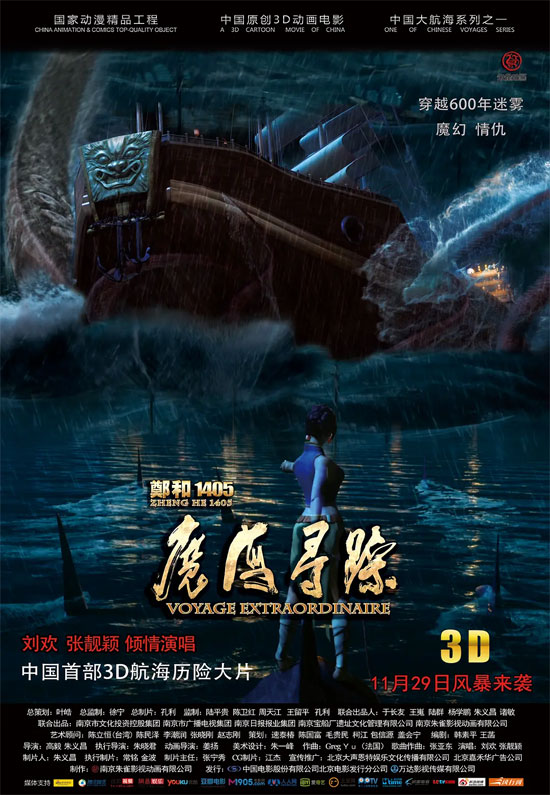Film Name: 郑和1405:魔海寻踪 / Voyage Extraordinaire

The year 2013 marked the 642nd anniversary of Zheng He’s birth and the 608th anniversary of his first voyage to the Western Seas (1405). July 11th is both the anniversary of Zheng He’s departure and China’s Maritime Day, while the film premiered on November 29, 2013. It can be said that in such a year and moment devoid of historical significance or uniqueness, an animated film about Zheng He’s voyages to the Western Seas titled “Voyage Extraordinaire” was released.
The film’s title was changed from “Zheng He 1405” to “Tracking the Magic Sea.” Its narrative shifted from telling Zheng He’s story to depicting two students from a maritime school who discover Zheng He’s traces on a magical sea and subsequently embark on a journey through time. One word sums it up: incongruous. The two students aren’t endearing, and their actions—sailing alone, casually tossing soda cans into the sea—are hardly commendable. Worse still, their intertwining with Zheng He’s narrative leaves the intended message utterly unclear. Perhaps the screenwriter and director found this premise amusing, but from a viewer’s perspective, it’s nothing short of baffling.
1405 marked Zheng He’s first voyage to the Western Seas—a year of profound historical significance. Personally, I believe any depiction of these voyages must capture the act of setting sail, as it embodies the most iconic aspect of a maritime expedition. A colossal treasure ship, a formidable fleet of over sixty warships, setting sail bearing national pride and a state mission, while courageously facing the uncertain dangers ahead—what a profoundly awe-inspiring spectacle that must have been. Yet the film seems utterly disinterested in portraying such a defining event. Though it borrows the theme of Zheng He’s voyages, it lacks both the depth of exploration and the basic respect this subject deserves.
Whether it was suppressing pirates, conducting trade and diplomatic missions, or engaging in various forms of diplomacy, all these endeavors required the foundation of a grand ceremonial departure to establish their value and emotional resonance. In other words, every obstacle encountered on the sea was anticipated at the outset. The very reason for setting sail despite knowing these dangers was to proclaim the image of the great Chinese nation and the courageous spirit of the Chinese people. The true quest of “Tracking the Mysterious Seas” is not to find Zheng He’s ship, but to seek the spirit of Zheng He’s voyages.
For an animated film not aimed at young children, the content is surprisingly simplistic. How did Zheng He so cleverly eliminate the pirates? Was it merely by seeing through their petty trick of poisoned wine, then adding a bit of so-called strategy like splitting his forces into two routes? How did Zheng He, through wisdom and sincerity, make the nations along his journey submit not only to the might of his powerful fleet but also to the lofty virtue of the Celestial Empire? Was it really as simple as retreating two nautical miles? Did the film present Zheng He with a final, ultimate dilemma—forcing him to choose between the greater national interest and his personal loyalty—and then use his ultimate decision to illuminate his noble character? None of that exists!
The film’s deliberate focus on Zheng He’s relationship with the princess not only fails to enhance the narrative but feels awkward. It’s not because Zheng He was a eunuch, but because he was a third party. It’s not that he couldn’t have feelings, but the film offers no morally acceptable explanation for his position between the prince of a tributary state and a princess sent for a political marriage.
To its credit, the film’s technical depiction of the ocean is quite successful. Whether in material rendering or foam effects, whether viewed from the surface or the depths, the ocean’s construction is remarkably accomplished. However, the film’s absence of a true sea voyage—a failure to capture the spirit of the open sea—leaves its characters lacking a sense of self-discovery. While the narrative strives to tell a story, it does so by piecing together implausible, illogical, and impossible elements. In short, this scarcely qualifies as a competent animated film.
Please specify:Anime Phone Cases » Voyage Extraordinaire 2013 Animation Film Review: The Absence of Going Overseas